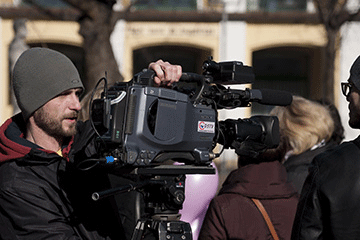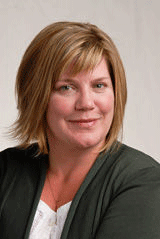
10/05/2015
Award-winning environment correspondent Molly Peterson will discuss new strategies that public broadcasters use to engage the community’s interest in action on Wednesday, Oct. 14.
Peterson, a journalist with Southern California Public Radio (SCPR) since 2007, will present “I See Change: The Transformative Impacts of Crowdsourced Climate Reporting” at 4:30 p.m. in Moffett Center, Room 2125. A reception to welcome her precedes the talk at 4 p.m. in the Rozanne M. Brooks Museum, Moffett Center, Room 2126.
The presentation is free and open to the public. The lecture continues the 2015-16 Rozanne M. Brooks Lecture Series themed on “The Culture of Thought,” which allows participants to explore what has shaped, and is changing, the way humans think about the world around them.
Peterson will explore the subject of journalism and its role in shaping American views on issues such as climate change.
Her employer, SCPR, is a media network that operates in Los Angeles and Orange County. Her broadcasts seek to fulfill the radio station’s aims to strengthen bonds that unite Southern California’s diverse communities, to create highest quality news and information, and to be a forum for engaging audiences on regional and global issues.
Peterson will focus on one particular project, “I See Change,” a national, crowd-sourced weather observation reporting initiative created in 2012 by producer Julia Kumari Drapkin. Peterson often invites the public to document environmental changes and connect with reporters and scientists to find answers about what they’re experiencing.
“‘I See Change’ is a community climate and weather journal,” said Peterson, who has reported, edited, directed programs and produced stories for National Public Radio (NPR).
The groundbreaking environmental reporting platform combines citizen science, participatory public media and cutting-edge satellite and sensor monitoring of environmental conditions.
“Reporting on climate change for years, I’ve heard from listeners that reports and studies seem kind of distant,” Peterson said. “We’re encouraging people to observe with us. What is happening in their environment becomes immediate and vital to our audience.”
 |
|
| Molly Peterson |
She develops conversations with her audience about such topics as climate, science and policy through social media, web-based live chats and comments through the use of participatory approaches to news sharing. One such avenue is called Public Insight Journalism (PIJ), a pioneering approach to journalism created by American Public Media. Through a collection of tools, many of them web-based, PIJ broadcasters solicit knowledge and direct experience from people with the basic goal is to do better journalism.
Peterson studied international politics at Georgetown University’s School of Foreign Service and attended University of California Hastings College of the Law.
The 2015-16 Brooks Lecture Series is sponsored by a grant from Auxiliary Services Corporation (ASC) and the Cortland College Foundation. For more information on the lecture or series, contact Sharon R. Steadman, professor of sociology/anthropology, lecture series organizer and Brooks Museum director at 607-753-2308.
Prepared by public relations intern Jessica McFadden